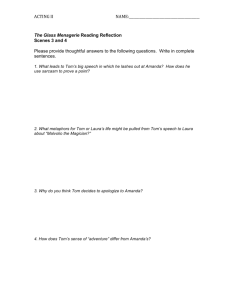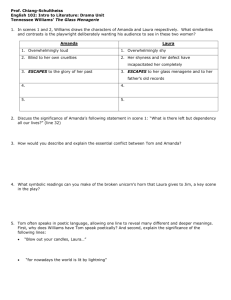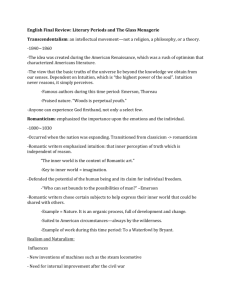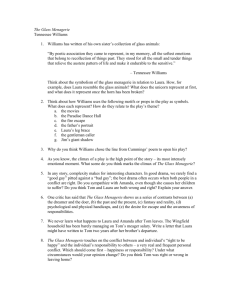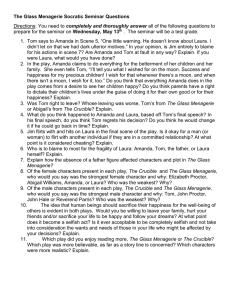Passage Exemplar for Unit 6 The Glass Menagerie TOM
advertisement
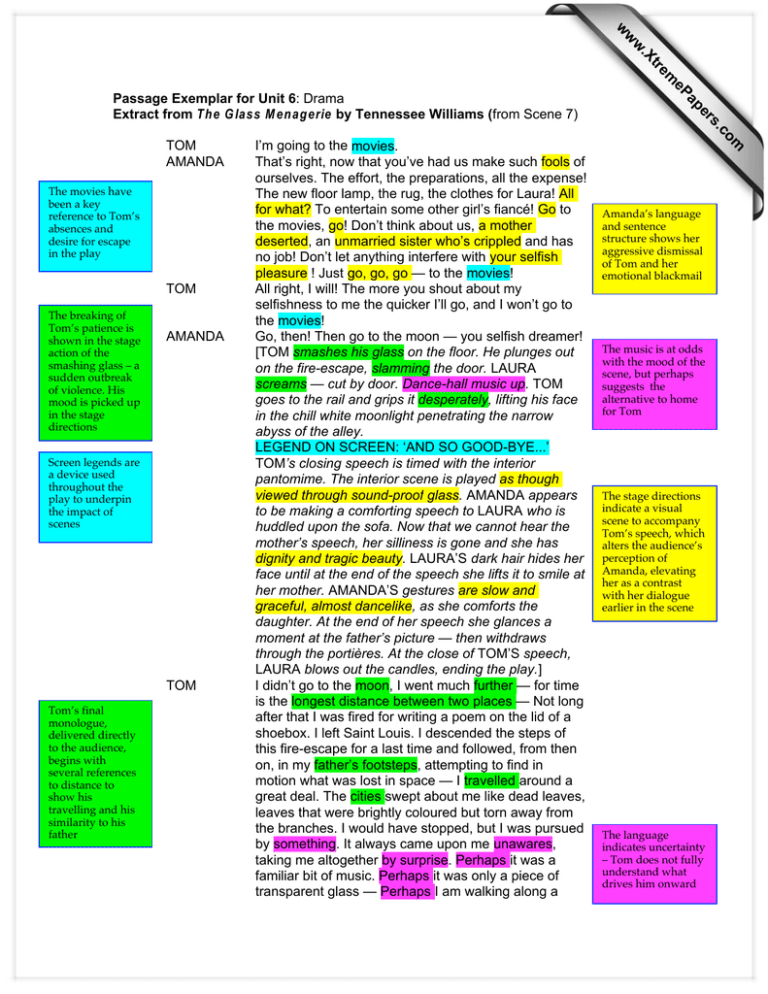
w w TOM The breaking of Tom’s patience is shown in the stage action of the smashing glass – a sudden outbreak of violence. His mood is picked up in the stage directions AMANDA Screen legends are a device used throughout the play to underpin the impact of scenes TOM Tom’s final monologue, delivered directly to the audience, begins with several references to distance to show his travelling and his similarity to his father om .c The movies have been a key reference to Tom’s absences and desire for escape in the play I’m going to the movies. That’s right, now that you’ve had us make such fools of ourselves. The effort, the preparations, all the expense! The new floor lamp, the rug, the clothes for Laura! All for what? To entertain some other girl’s fiancé! Go to the movies, go! Don’t think about us, a mother deserted, an unmarried sister who’s crippled and has no job! Don’t let anything interfere with your selfish pleasure ! Just go, go, go — to the movies! All right, I will! The more you shout about my selfishness to me the quicker I’ll go, and I won’t go to the movies! Go, then! Then go to the moon — you selfish dreamer! [TOM smashes his glass on the floor. He plunges out on the fire-escape, slamming the door. LAURA screams — cut by door. Dance-hall music up. TOM goes to the rail and grips it desperately, lifting his face in the chill white moonlight penetrating the narrow abyss of the alley. LEGEND ON SCREEN: ‘AND SO GOOD-BYE...’ TOM’s closing speech is timed with the interior pantomime. The interior scene is played as though viewed through sound-proof glass. AMANDA appears to be making a comforting speech to LAURA who is huddled upon the sofa. Now that we cannot hear the mother’s speech, her silliness is gone and she has dignity and tragic beauty. LAURA’S dark hair hides her face until at the end of the speech she lifts it to smile at her mother. AMANDA’S gestures are slow and graceful, almost dancelike, as she comforts the daughter. At the end of her speech she glances a moment at the father’s picture — then withdraws through the portières. At the close of TOM’S speech, LAURA blows out the candles, ending the play.] I didn’t go to the moon, I went much further — for time is the longest distance between two places — Not long after that I was fired for writing a poem on the lid of a shoebox. I left Saint Louis. I descended the steps of this fire-escape for a last time and followed, from then on, in my father’s footsteps, attempting to find in motion what was lost in space — I travelled around a great deal. The cities swept about me like dead leaves, leaves that were brightly coloured but torn away from the branches. I would have stopped, but I was pursued by something. It always came upon me unawares, taking me altogether by surprise. Perhaps it was a familiar bit of music. Perhaps it was only a piece of transparent glass — Perhaps I am walking along a s er TOM AMANDA ap eP m e tr .X w Passage Exemplar for Unit 6: Drama Extract from The Glass Menagerie by Tennessee Williams (from Scene 7) Amanda’s language and sentence structure shows her aggressive dismissal of Tom and her emotional blackmail The music is at odds with the mood of the scene, but perhaps suggests the alternative to home for Tom The stage directions indicate a visual scene to accompany Tom’s speech, which alters the audience’s perception of Amanda, elevating her as a contrast with her dialogue earlier in the scene The language indicates uncertainty – Tom does not fully understand what drives him onward References to glass and colour make the emotional link with Laura and her glass menagerie The play ends with dialogue and stage action linked as Laura, the central character, blows out the candles and plunges the stage into darkness street at night, in some strange city, before I have found companions. I pass the lighted window of a shop where perfume is sold. The window is filled with pieces of coloured glass, tiny transparent bottles in delicate colours, like bits of a shattered rainbow. Then all at once my sister touches my shoulder. I turn around and look into her eyes... Oh, Laura, Laura, I tried to leave you behind me, but I am more faithful than I intended to be! I reach for a cigarette, I cross the street, I run into the movies or a bar, I buy a drink, I speak to the nearest stranger — anything that can blow your candles out! [LAURA bends over the candles.] — for nowadays the world is lit by lightning! Blow out your candles, Laura — and so good-bye... [She blows the candles out.] THE SCENE DISSOLVES The language indicates the immediacy of Laura’s memory, as Tom addresses her and Laura, in the silent part of the stage, seems to respond This is the final scene of the play, which completes Tom’s role as a narrator and clarifies the play’s status as a ‘memory play’. It delivers the climax of Tom’s departure which has been threatened throughout but has been impelled by the disastrous visit of Jim. Tom is finally linked in his departure with his absent father, whose photograph has been an important part of the stage set. The scene pulls together the concerns with memory, absence and Laura and her glass animals, but while the extract begins with Amanda at her worst in her dialogue, Williams’ stage devices finally elevate her and Laura to a position of tragic dignity.
